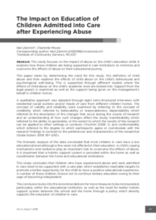Abstract:
This study focuses on the impact of abuse on the child’s education while it explores how these children are being supported in care institutions to minimize and overcome the effects of abuse on their educational journey.
This paper starts by determining the need for this study, the definition of child abuse and then explores the effects of child abuse on the child’s behavioural and psychological well-being. This is supported through different studies where the effects of child abuse on the child’s academic level are looked into. Support from the legal aspect is examined as well as the support being given on the management’s behalf in children homes.
A qualitative approach was adopted through eight semi-structured interviews with residential social workers and/or heads of care from different children homes. The concept of validity and reliability were examined by referring to the concept of credibility which referred to believability or reasonableness; dependability which referred to the description of the changes that occur during the course of research and an understanding of how such changes affect the study; transferability which referred to the ability to generalize, or the extent to which the results of the research can be applied to other settings or contexts (Trochim 2006: 1); and conformability which referred to the degree to which participants agree or corroborate with the research findings in contrast to the preferences and characteristics of the researcher (Guba Guba’s 2018: 197–250).
The thematic analysis of the data concluded that most children in care have a low educational level although a few were not affected in their education. A child’s coping mechanisms and resilience play an important role to overcome the effects of abuse. It is important that a holistic support system is provided within the home as well as coordination between the home and educational institutions.
This study concludes that children who have experienced abuse and were admitted in care need to be supported with a care plan which establishes reachable targets to promote a better opportunity for the child to have a positive educational experience. A number of these children choose not to continue tertiary education owing to their urge of becoming independent.
The conclusion looks into the recommendations for more measures to be incorporated, particularly within the educational institution, as well as the need for better holistic support system between the school and the home through a policy which directly supports the education of children in care.

